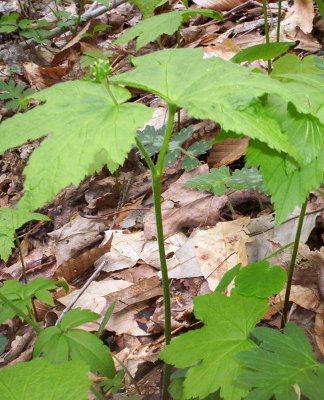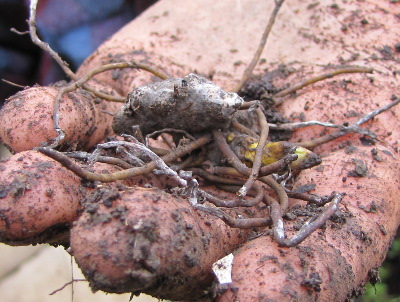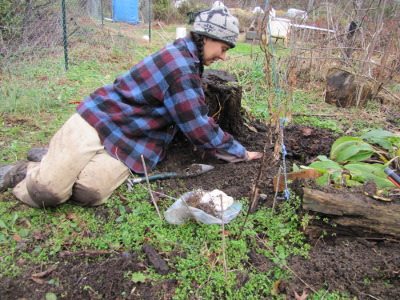
Ginseng and goldenseal in the forest garden
 Goldenseal
and ginseng both grow wild in our woods and are harvested for their
medicinal roots. Ginseng, especially, is much sought after,
bringing hundreds of dollars per pound when dried. Years ago, I
planted some ginseng in my woods, hoping the
$100 worth of seeds would grow into $10,000 worth of plants over the
next decade.
Sadly, my neighbors came and stole the plants before they'd
matured. I don't really blame my neighbors since they probably
figure I was too much of a city slicker to know what ginseng is, and
it's hard to turn down hundred dollar bills you walk past on the forest
floor. Still, the failed experiment ensured I wasn't going to
plant any more ginseng in the back forty.
Goldenseal
and ginseng both grow wild in our woods and are harvested for their
medicinal roots. Ginseng, especially, is much sought after,
bringing hundreds of dollars per pound when dried. Years ago, I
planted some ginseng in my woods, hoping the
$100 worth of seeds would grow into $10,000 worth of plants over the
next decade.
Sadly, my neighbors came and stole the plants before they'd
matured. I don't really blame my neighbors since they probably
figure I was too much of a city slicker to know what ginseng is, and
it's hard to turn down hundred dollar bills you walk past on the forest
floor. Still, the failed experiment ensured I wasn't going to
plant any more ginseng in the back forty.
Goldenseal roots aren't
quite as highly priced, which is probably why my patch of goldenseal
(not planted by me) is still around. I'm most interested in the
medicinal  qualities of goldenseal since
the roots contain a strong antibiotic that complements the echinacea
growing in my garden. My doctor sister once explained to me that
echinacea is best above the belt and goldenseal below, and a few
minutes of research confirms that goldenseal's effectiveness is due to
increasing the secretion of mucous membranes (thus helping with
problems like urinary tract infections.) All of that said, the
few times I've wanted to chew on some goldenseal roots, I felt too sick
to climb up to the top of the hill to harvest them.
qualities of goldenseal since
the roots contain a strong antibiotic that complements the echinacea
growing in my garden. My doctor sister once explained to me that
echinacea is best above the belt and goldenseal below, and a few
minutes of research confirms that goldenseal's effectiveness is due to
increasing the secretion of mucous membranes (thus helping with
problems like urinary tract infections.) All of that said, the
few times I've wanted to chew on some goldenseal roots, I felt too sick
to climb up to the top of the hill to harvest them.
 Which is all a long way of
saying that when my mother gave me some ginseng seeds and goldenseal
roots, I thought, "Why not try them out in the forest garden?"
The forest
garden island around my kitchen peach has the high organic matter
and mycelium-rich soil that woodland herbs crave and has been a good
home for Burdick's
Wild Leek. I
figured ginseng outside my kitchen window definitely won't get stolen,
and goldenseal in that location will be close enough to dig no matter
how bad I feel. I'll let you know how the herbs do in their
semi-cultivated location next year.
Which is all a long way of
saying that when my mother gave me some ginseng seeds and goldenseal
roots, I thought, "Why not try them out in the forest garden?"
The forest
garden island around my kitchen peach has the high organic matter
and mycelium-rich soil that woodland herbs crave and has been a good
home for Burdick's
Wild Leek. I
figured ginseng outside my kitchen window definitely won't get stolen,
and goldenseal in that location will be close enough to dig no matter
how bad I feel. I'll let you know how the herbs do in their
semi-cultivated location next year.
Want more in-depth information? Browse through our books.
Or explore more posts by date or by subject.
About us: Anna Hess and Mark Hamilton spent over a decade living self-sufficiently in the mountains of Virginia before moving north to start over from scratch in the foothills of Ohio. They've experimented with permaculture, no-till gardening, trailersteading, home-based microbusinesses and much more, writing about their adventures in both blogs and books.
Want to be notified when new comments are posted on this page? Click on the RSS button after you add a comment to subscribe to the comment feed, or simply check the box beside "email replies to me" while writing your comment.

Well, I don't know which neighbors it was, so it's tough to do anything about it. And it's a bit of a complex topic --- people around here have been making significant portions of their income hunting ginseng for hundreds of years. Even though we own the property now, some of our neighbors' grandparents had a homeplace right where we now live. They might have learned the ginseng spots from them and been digging them for generations. There were a few wild plants in the same area I planted my seeds and most people around here only gather wild ginseng, so they probably didn't even realize the stand was planted.
Here's the thought problem I threw at Mark: If you were walking on someone else's property and a mudslide had exposed a Native American artifact that you knew was worth thousands of dollars, would you pick it up and take it home? What if you knew the owner of the property rarely walked in that area and the artifact would get covered up by leaves and undergrowth shortly and disappear into the ground? What if you didn't think the owner of the property would even recognize the artifact as anything other than an old bowl?
Which is not to say I wouldn't prefer it if people left my ginseng alone...